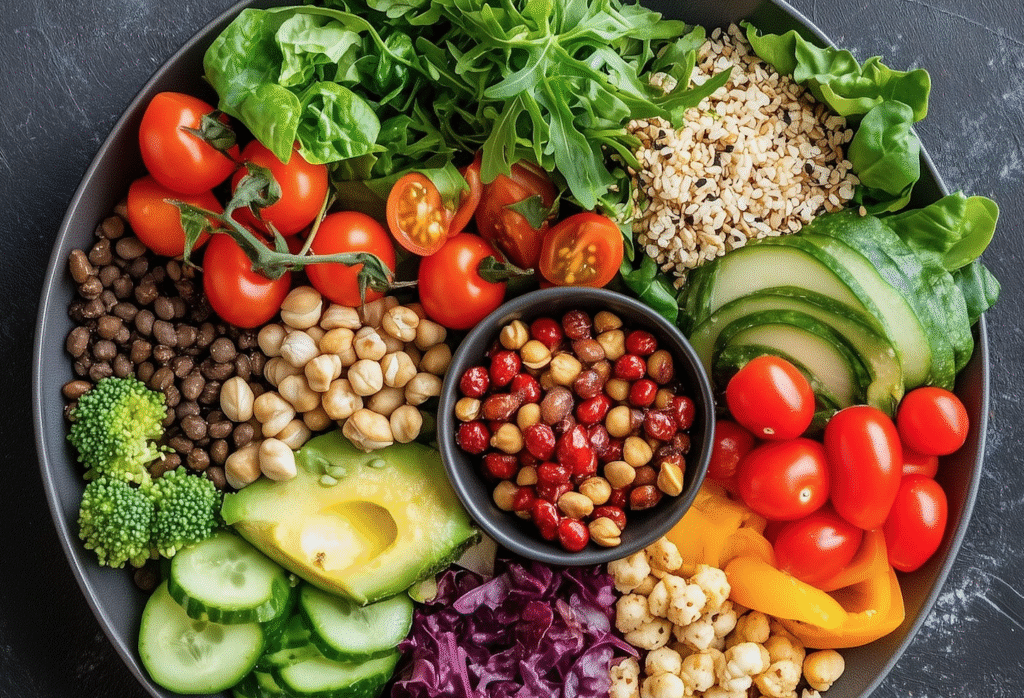Boost immune system – Why Immune Health Starts on Your Plate
If you’re constantly battling seasonal colds, feeling run-down, or just want to stay healthier year-round, you’re not alone. In today’s fast-paced world, our immune systems take a beating from stress, poor sleep, and environmental toxins. That’s why finding superfoods to boost immune system function has never been more important.
The good news? Nature provides powerful foods packed with immune-supporting nutrients. Superfoods that can make a real difference. In this post, we’ll explore the top 10 superfoods to boost immune system health, break down their benefits, compare them side-by-side, and help you make smart choices for long-term wellness.
1. Garlic
Garlic has been used for centuries as a medicinal food, and science continues to confirm its immune-boosting power. The secret lies in its sulfur-containing compounds, particularly allicin, which is released when garlic is crushed or chopped. Allicin has strong antimicrobial and antiviral properties, helping your body fight off infections before they take hold. Garlic also stimulates the activity of white blood cells, making your immune system more responsive to pathogens. Adding garlic to your diet is easy—just toss it into stir-fries, soups, or salad dressings. While its pungent aroma might not appeal to everyone, the benefits far outweigh the drawbacks. For those sensitive to raw garlic, aged garlic supplements can be a gentler option.
Pros:
- Affordable and widely available
- Easy to add to meals
- Scientifically backed immune-boosting effects
Cons:
- Strong smell and taste may not appeal to everyone
- Can cause digestive discomfort in large quantities
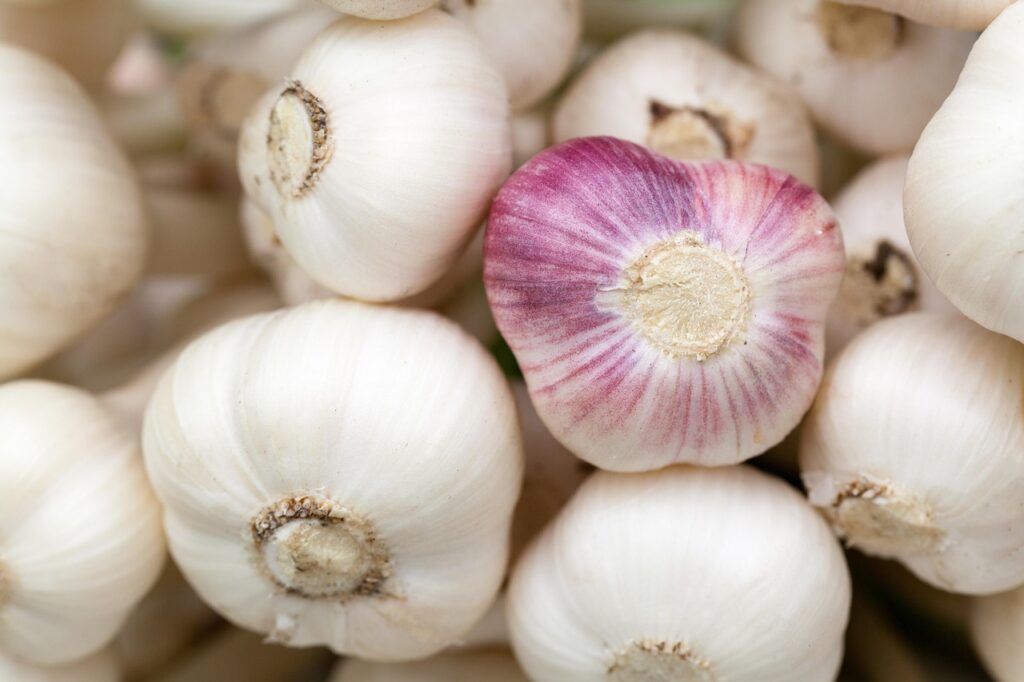
2. Blueberries
Blueberries are one of the richest sources of antioxidants among commonly eaten fruits. They’re particularly high in flavonoids, a group of plant compounds that support immune health by reducing inflammation and oxidative stress. These small berries help protect your cells from damage while also enhancing the function of immune cells. Studies suggest that regular blueberry consumption can improve the body’s response to respiratory infections, especially in older adults. Their naturally sweet taste makes them perfect for smoothies, oatmeal, or as a snack on their own. While fresh blueberries can be pricey when out of season, frozen varieties are just as nutritious and more budget-friendly. They also contribute to better gut health, which plays a critical role in immune function. If possible, try growing your own blueberries. Check which varieties are best for your climate. Some people also grow them in pots if outdoor space is limited.
Pros:
- Delicious and versatile
- Great source of vitamins C and K
- Supports cognitive health
Cons:
- Can be expensive when out of season
- Perishable and best eaten fresh or frozen

3. Fatty Fish (Salmon, Mackerel, Sardines)
Fatty fish such as salmon, mackerel, and sardines are among the best dietary sources of omega-3 fatty acids. These healthy fats help reduce chronic inflammation – a condition that can weaken the immune system over time. Omega-3s enhance the function of immune cells and help the body respond more effectively to infections. Fatty fish are also excellent sources of vitamin D, a nutrient essential for regulating the immune response. Many people are deficient in vitamin D, especially during winter months when sun exposure is limited. Including fatty fish in your diet two to three times per week can significantly improve your immune health. However, those who are vegetarian or vegan can consider algae-based omega-3 supplements. While some fish may contain trace amounts of mercury, choosing wild-caught options and rotating fish types can mitigate risks.
Pros:
- Supports both heart and immune health
- High in nutrients difficult to get elsewhere
- Fatty acids help regulate immune cells
Cons:
- Can contain mercury (especially in large fish)
- Not suitable for vegans/vegetarians

4. Green Tea
Green tea is more than just a soothing beverage; it’s a powerhouse of immune-boosting compounds. It contains high levels of catechins, especially epigallocatechin gallate (EGCG), which have strong antioxidant and anti-inflammatory effects. These compounds help combat oxidative stress and support immune cell function. Green tea also contains the amino acid L-theanine, which may aid in the production of germ-fighting T-cells. Drinking green tea regularly has been linked to lower rates of respiratory infections. It’s best consumed without milk to preserve its antioxidant properties. While some people may find it slightly bitter, adjusting steeping time or adding a bit of honey can make it more enjoyable. For those sensitive to caffeine, decaffeinated green tea still retains many of its immune benefits.
Pros:
- Calorie-free and hydrating
- Can be enjoyed hot or cold
- Mild caffeine content
Cons:
- May interfere with iron absorption if consumed with meals
- Bitter if over-steeped

5. Citrus Fruits (Oranges, Grapefruit, Lemons)
Citrus fruits like oranges, lemons, limes, and grapefruits are widely known for their high vitamin C content. Vitamin C is crucial for the immune system as it helps stimulate the production of white blood cells, which fight off infections. It also acts as a powerful antioxidant, protecting cells from damage caused by free radicals. Citrus fruits are also hydrating and provide fiber, which supports digestive health – an often-overlooked component of immunity. These fruits are incredibly versatile: add lemon to your water, toss orange slices into a salad, or enjoy a grapefruit for breakfast. While they’re generally safe for most people, those with acid reflux may need to moderate their intake. Still, their ability to shorten the duration and severity of colds makes them a must-have in your immune-supporting diet.
Pros:
- Widely available and affordable
- Great for skin and wound healing
- Easy to incorporate into diet
Cons:
- High acidity can affect tooth enamel
- Some people may have citrus allergies

6. Spinach
Spinach is a nutritional powerhouse that supports immune health in multiple ways. It’s rich in vitamin C, beta-carotene, folate, and iron – all of which contribute to the body’s natural defense mechanisms. The antioxidants in spinach help reduce inflammation, while its high fiber content supports gut health. Beta-carotene, a precursor to vitamin A, plays a crucial role in maintaining the integrity of skin and mucous membranes, your body’s first line of defense. Spinach is incredibly versatile and can be eaten raw in salads or blended into smoothies. Lightly cooking spinach helps enhance the absorption of some nutrients like vitamin A and iron. While it contains oxalates that may inhibit calcium absorption, moderate consumption as part of a balanced diet poses no issues for most people.
Pros:
- Very low in calories
- Easy to add to smoothies, salads, or cooked meals
- Supports eye health too
Cons:
- High in oxalates, which may interfere with calcium absorption
- Needs proper washing to avoid bacteria contamination

7. Almonds
Almonds are rich in vitamin E, a fat-soluble antioxidant that helps maintain a healthy immune system. Unlike vitamin C, which is water-soluble and quickly flushed from the body, vitamin E stays in your system longer and supports long-term immune function. Almonds also provide healthy fats, protein, and magnesium, making them an all-around nutritious snack. Just a small handful a day can make a significant impact on your health. They are shelf-stable, portable, and easy to add to both savory and sweet dishes. Almond butter is another convenient option. However, due to their calorie density, it’s best to enjoy almonds in moderation. For those with nut allergies, sunflower seeds offer a similar nutrient profile and can be a great alternative.
Pros:
- Portable and shelf-stable
- Great snack or topping
- Supports skin and heart health too
Cons:
- Calorie-dense
- Common allergen for some people
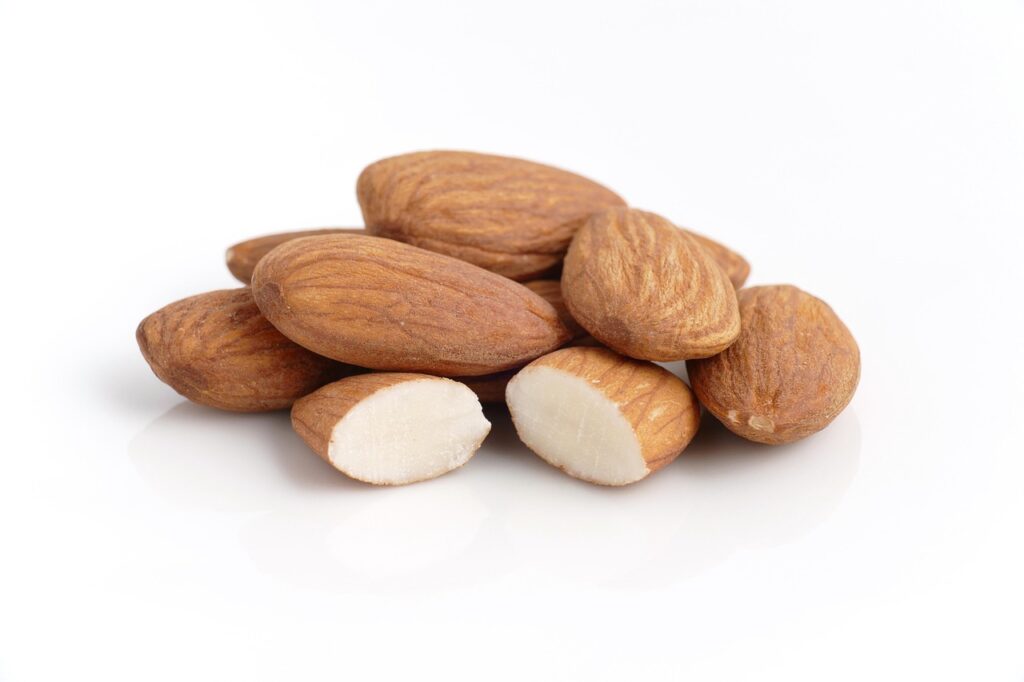
8. Mushrooms (Shiitake, Reishi, Maitake)
Mushrooms, especially varieties like shiitake, maitake, and reishi, are rich in beta-glucans—compounds known to modulate the immune system. These natural polysaccharides enhance the activity of macrophages and natural killer cells, which are essential for fighting infections. Mushrooms also contain selenium and B vitamins, both of which support immune function and energy metabolism. Some types, like reishi, are considered adaptogens and help the body manage stress – a major contributor to weakened immunity. Mushrooms can be enjoyed grilled, sautéed, or added to soups and stews. For a concentrated immune boost, mushroom powders or extracts are also available. While not everyone enjoys their texture, incorporating even small amounts into your meals can provide noticeable benefits.
Pros:
- Can be used fresh, dried, or as supplements
- Excellent meat substitute in plant-based diets
- Proven antiviral and antibacterial compounds
Cons:
- Taste/texture not liked by everyone
- Some types are pricey or hard to find fresh

9. Turmeric
Turmeric is a bright yellow spice celebrated for its anti-inflammatory and immune-enhancing properties. Its active ingredient, curcumin, has been extensively studied for its ability to modulate the immune system and fight off pathogens. Curcumin helps regulate inflammatory cytokines and supports the activity of T-cells, B-cells, and other immune cells. However, curcumin is not easily absorbed on its own. Consuming it with black pepper (which contains piperine) and healthy fats significantly boosts its bioavailability. Turmeric can be used in curries, golden milk, or even smoothies. Supplements are also available for more concentrated doses. While generally safe, excessive intake can cause digestive issues in some people. Still, when used regularly in moderate amounts, turmeric offers robust immune support.
Pros:
- Versatile in both sweet and savory dishes
- Can be consumed as a tea or supplement
- May help with joint and brain health too
Cons:
- Stains easily
- Low bioavailability unless paired with fat or piperine
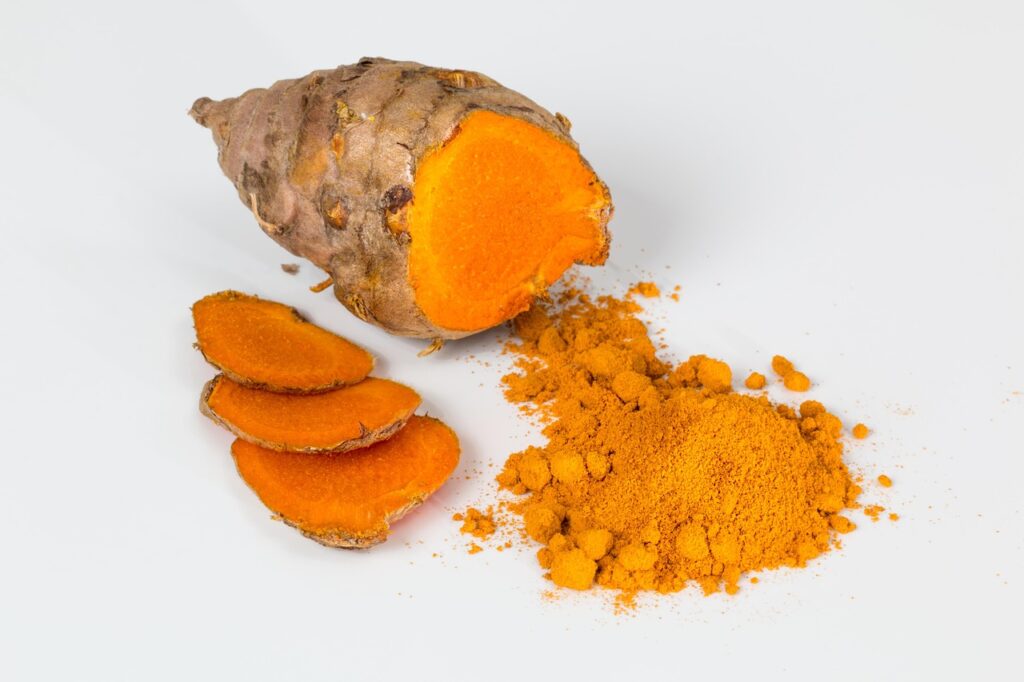
10. Yogurt (with Live Cultures)
Yogurt is a fermented dairy product that offers a rich source of probiotics – the beneficial bacteria that live in your gut. Since about 70% of your immune system is housed in the gut, maintaining a healthy microbiome is crucial for immune defense. Yogurt supports digestive health, helps produce antimicrobial substances, and enhances the function of immune cells. It’s also a great source of protein, calcium, and vitamin D. To maximize benefits, choose plain, unsweetened yogurt with “live and active cultures.” Greek yogurt offers higher protein content, while dairy-free options made from almond or coconut milk are ideal for those who are lactose intolerant. Be cautious of flavored yogurts, which often contain added sugars that can undermine your health goals.
Pros:
- Supports digestion and immunity together
- Available in dairy-free options too
- Easy to flavor naturally with fruit
Cons:
- Some contain added sugars
- Lactose intolerance can be an issue
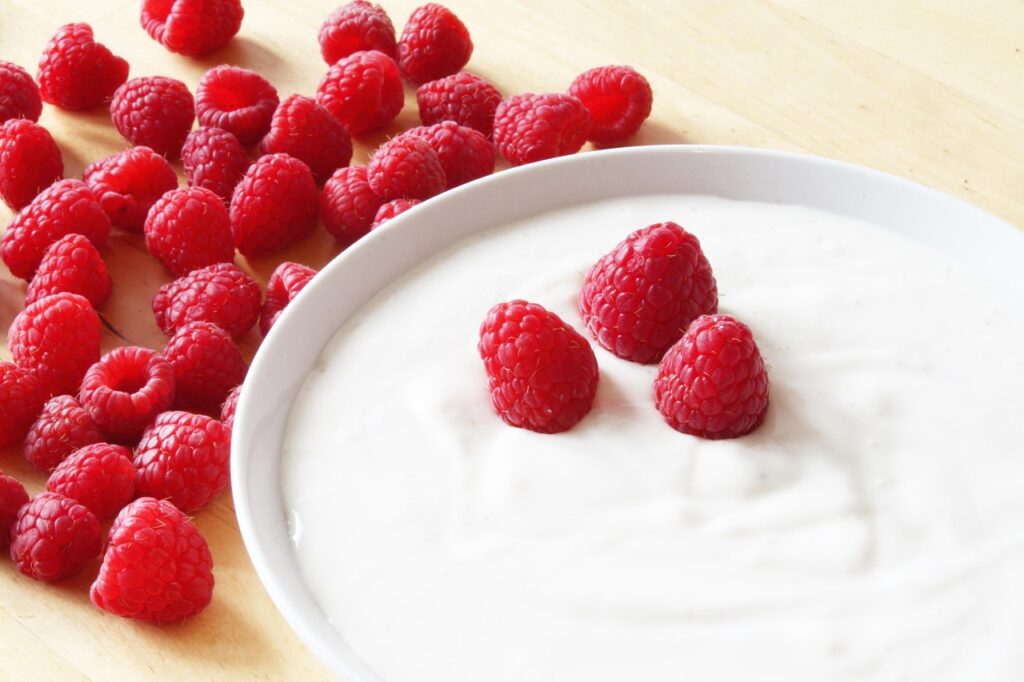
Boost immune system – Comparison chart
| Superfood | Key Nutrients | Immune Benefits | Best For |
|---|---|---|---|
| Garlic | Allicin, sulfur compounds | Antiviral, antibacterial, supports white blood cells | Overall immunity boost |
| Blueberries | Flavonoids, vitamin C | Antioxidant support, respiratory protection | Inflammation & aging |
| Fatty Fish | Omega-3s, vitamin D | Anti-inflammatory, supports cell function | Chronic inflammation |
| Green Tea | EGCG, L-theanine | Antioxidant, enhances immune cell production | Daily immune defense |
| Citrus Fruits | Vitamin C, fiber | Supports white blood cells, shortens cold duration | Cold/flu prevention |
| Spinach | Vitamin C, beta-carotene, folate | Antioxidant, strengthens skin barriers | Nutrient-dense meals |
| Almonds | Vitamin E, healthy fats | Long-term antioxidant support | Snacking, skin health |
| Mushrooms | Beta-glucans, selenium | Modulates immune cells, antiviral properties | Immunity under stress |
| Turmeric | Curcumin | Anti-inflammatory, boosts immune response | Joint pain & inflammation |
| Yogurt | Probiotics, calcium, vitamin D | Gut-immune axis support | Gut health & immunity |
FAQ: Superfoods and Immunity
1. How quickly do superfoods work to improve immunity?
It depends on your current diet and health status. While no food works overnight, consistently consuming immune-supporting superfoods over weeks or months can significantly strengthen your defenses.
2. Can I get the same benefits from supplements instead of whole foods?
Supplements can help if you’re deficient in specific nutrients, but whole foods offer fiber, antioxidants, and other compounds that work together synergistically. It’s best to focus on food first.
3. Are there side effects to eating too many superfoods?
Yes. Even healthy foods can cause issues in excess. For example, too much turmeric may upset digestion, and high citrus intake might harm tooth enamel. Moderation and variety are key.
Final thoughts: Fuel Your Immune System Naturally
Your immune system works around the clock to protect you, and the right foods can make its job easier. From antioxidant-packed blueberries to probiotic-rich yogurt, these superfoods to boost immune system function offer simple, natural ways to stay healthier year-round.
By including these top 10 superfoods into your daily meals, you’ll not only strengthen your immunity but also support better energy, mood, and overall well-being. Mix them into smoothies, sprinkle them over salads, or sip them in tea—every bite makes a difference.
Start small, stay consistent, and let food be your everyday medicine.
Feel free to save the comparison chart for your future reference or save this blog post in your bookmarks.
Let us know what is your favorite super food or share a recipe below. We would love to hear from you!

